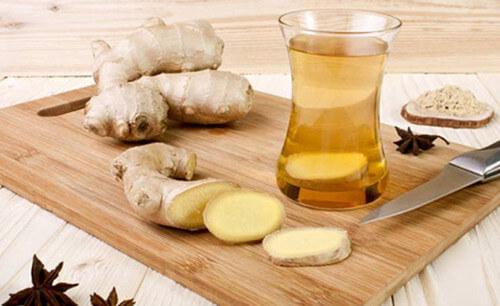Seven Natural Remedies to Stop Vomiting

Vomiting may be caused by the consumption of spoiled food or poor digestion. However, it may also be related to pregnancy, an infection, or another condition. In all cases, it’s important to have some homemade solutions on hand to stop vomiting and reduce the risk of dehydration.
In this article, we’ll share seven natural remedies to stop vomiting and re-hydrate the body. Ginger, seawater, mint, and cinnamon are some of the ingredients you can use to recover quickly.
Natural Remedies to Stop Vomiting
1. Ginger

One of the most effective remedies to stop vomiting is ginger. This spicy food is also a safe remedy in case of pregnancy. It also has many other properties to fight fluid retention and boost metabolism, which may help you lose weight.
If you’ve been vomiting for a while, cut a piece of raw ginger and suck on it until your discomfort goes away. If you’re suffering from morning sickness, you can drink ginger lemonade sweetened with honey or stevia when you wake up. You can also buy candied ginger and always have it on hand.
Take a look at this article: Discover the 5 Benefits of Ginger Water
2. Seawater and honey
The solution we share below helps reduce the risk of dehydration and vomiting at the same time, as it functions as a saline solution. People who have the opportunity to buy seawater suitable for consumption should combine it with honey as follows:
- Put a teaspoon of seawater and honey under your tongue to prevent vomiting.
- Repeat for as long as your body tolerates it.
3. Ginkgo biloba
Ginkgo biloba is a medicinal plant characterized by its ability to promote oxygenation, especially in the head. This is why it’s very effective to treat dizziness, vertigo, and vomiting.
You can drink ginkgo biloba infusion whenever you need it. If you want to take it as a preventive treatment, don’t drink it for more than three months.
4. Mint

Mint is one of the best remedies to stop vomiting due to its delicious flavor and refreshing power. This medicinal plant relieves heartburn and balances stomach function. In addition, it can also help reduce the risk of dizziness during travels.
You can buy natural mint gum or candy or always carry a bottle of mint essential oil. Another option to reduce the risk of dizziness and vomiting is to combine ginger and mint in a tea.
5. Lemon balm
Lemon balm is a great digestive remedy. It stands out because, besides preventing stomach conditions, it also calms the nerves that affect digestion. Therefore, it’s suitable to stop vomiting caused by nerves or chemotherapy.
You can drink lemon balm tea for this purpose. You can also find its essential oil to complement the treatment and enjoy a really long-lasting relaxing effect.
6. Licorice
Licorice, with its sweet and intense flavor, is a natural remedy to stop vomiting and nausea. Just sucking on a piece of licorice will do the trick. You can also prepare a licorice infusion.
Licorice has digestive and expectorant properties. However, it’s important to note that licorice can raise blood pressure. Therefore, you must consume it in moderation or avoid it if you suffer from high blood pressure.
7. Cinnamon
Cinnamon is a very sweet and aromatic spice that can help treat digestive disorders. It also helps boost metabolism, lower blood sugar levels, and stop vomiting. In addition, it has a very pleasant flavor.
You can drink it in an infusion or add it to foods. However, we emphasize that you must always choose Ceylon cinnamon, which is the one that has the most medicinal properties and, therefore, may help stop vomiting.
All cited sources were thoroughly reviewed by our team to ensure their quality, reliability, currency, and validity. The bibliography of this article was considered reliable and of academic or scientific accuracy.
- Ernst, E., & Pittler, M. H. (2000). Efficacy of ginger for nausea and vomiting: A systematic review of randomized clinical trials. British Journal of Anaesthesia. https://doi.org/10.1093/oxfordjournals.bja.a013442
- Ozgoli, G., Goli, M., & Simbar, M. (2009). Effects of Ginger Capsules on Pregnancy, Nausea, and Vomiting. The Journal of Alternative and Complementary Medicine. https://doi.org/10.1089/acm.2008.0406
- Dziwenka, M., & Coppock, R. W. (2016). Ginkgo biloba. In Nutraceuticals: Efficacy, Safety and Toxicity. https://doi.org/10.1016/B978-0-12-802147-7.00049-8
- Taneja, S. C., & Chandra, S. (2012). Mint. In Handbook of Herbs and Spices: Second Edition. https://doi.org/10.1533/9780857095671.366
- Rao, P. V., & Gan, S. H. (2014). Cinnamon: A multifaceted medicinal plant. Evidence-Based Complementary and Alternative Medicine. https://doi.org/10.1155/2014/642942
This text is provided for informational purposes only and does not replace consultation with a professional. If in doubt, consult your specialist.








